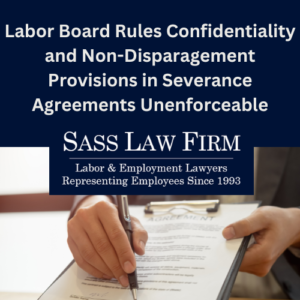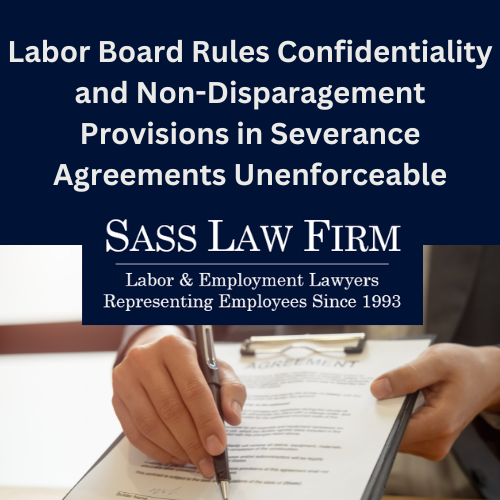If your employer presented you with a severance agreement or you previously signed a severance agreement that requires confidentiality and/or non-disparagement provisions, keep reading as these provisions by may be illegal and unenforceable.
Often, when employers terminate employees—as part as a reduction in force or a position elimination—the employer may present the affected employees with severance agreements. It is not uncommon for those agreements to require terminated employees to keep the agreement confidential or agree not to make any derogatory or negative statements about the employer as a condition to receive the severance pay.
In an effort to prevent or limit these provisions, the National Labor Relations Board (“NLRB”) held on February 21, 2023 in the McLaren Macomb decision that broad non-disparagement and confidentiality provisions contained in severance agreements are illegal and unenforceable. This is good news for employees. For years, employers have had the upper hand in controlling a former employee’s post-employment conduct by conditioning much needed severance upon the employee waiving any and all legal claims, and requiring the employee to be bound by broad “gag orders.” While these sorts of provisions were held to be enforceable during the Trump era, the NLRB recently recognized that these types of provisions violate an employee’s right to engage in concerted activity in violation of federal law. Significantly, the employer does not have to actually try to enforce these provisions to violate the law. Instead, just the fact that the employer presented an employee with a severance agreement with broad non-disparagement and/or confidentiality provisions is a violation in and of itself.
It is too soon to know how employers will respond to this new development. Going forward, some employers may try and revise their agreements to include narrow confidentiality and non-disparagement provisions. Other employers may include a catch-all type of disclaimer, such as having an affirmative statement in the agreement that says the terms do not prevent you from engaging in concerted activity. Whether such workarounds will pass muster is yet to be decided and will likely be reviewed by the NLRB on a case-by-case basis. Many employers may eliminate these provisions from their agreements altogether.
The NLRB’s decision also appears to support invalidating these provisions in severance agreements signed before the Board’s February 21, 2023 decision. But, this has not yet been fully developed, so stay tuned to find out how the Board will handle agreements signed prior to its decision.
As the enforceability of such provisions in severance agreements is always shifting, when presented with a severance agreement, you owe it to yourself to have the agreement reviewed with an experienced employment attorney. The lawyers at Sass Law Firm are experienced in reviewing and negotiating severance agreements to best protect each individual employee’s rights.


